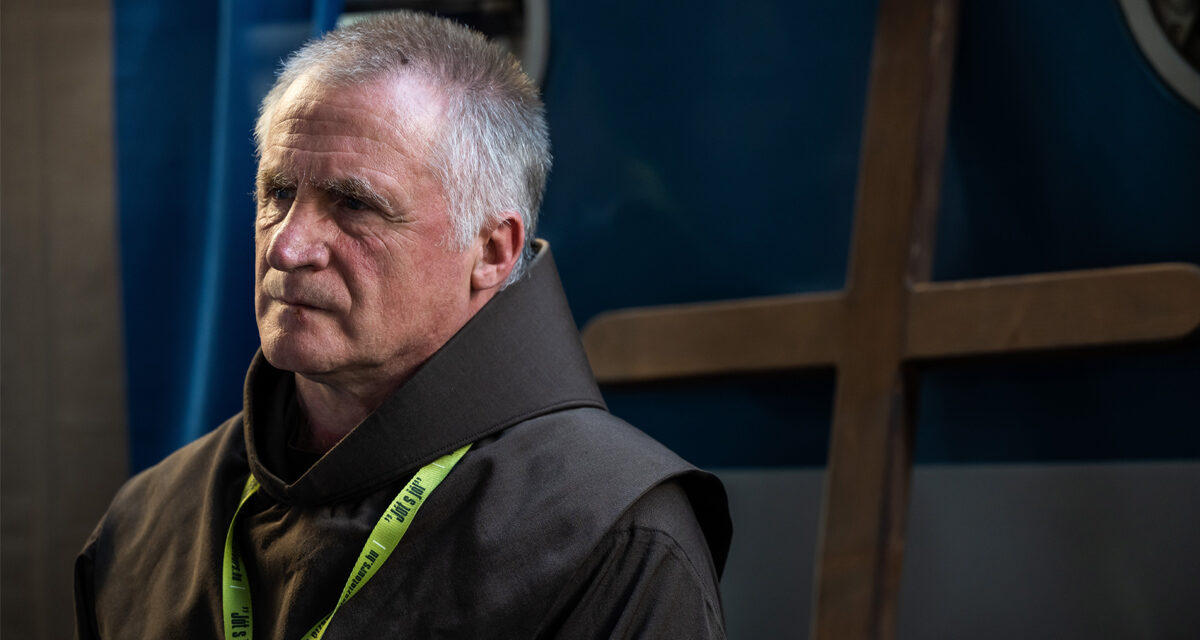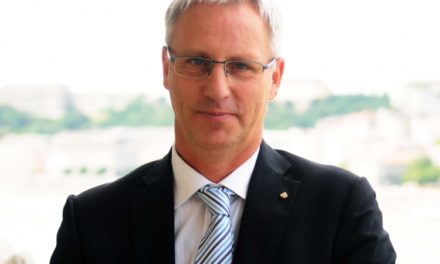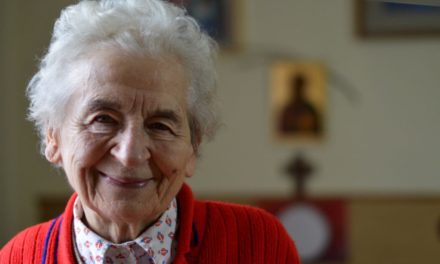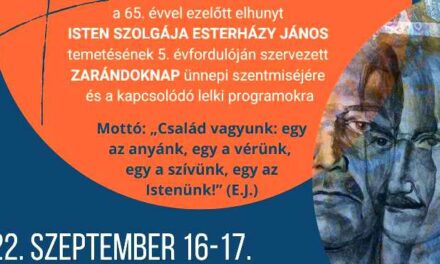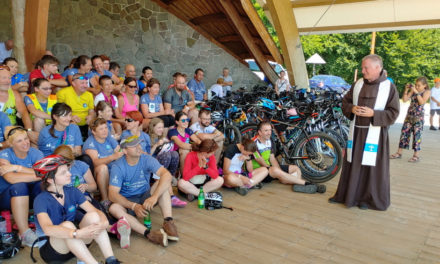Interview with Csaba Böjte.
I saw that even the poorest child has the opportunity to make good decisions, and the richest child also has the opportunity to screw something up. Free will is very important. With the final judgment, God will not hold the teacher or the party to account for you, but you yourself. You have to make a good decision under the circumstances in which you live, says Franciscan monk Csaba Böjte, whose biography was recently published.
The founder of the Szent Ferenc Foundation in Déva, who was awarded the Hungarian Order of Honor this summer, speaks of the trials of the past years as if his zest for life and love have not diminished. - I feel that I should serve God and my fellow human beings even more clearly, better and more intensively - says brother Csaba, who also talks about his six thousand children, the presence of the evil spirit and human stupidity in the interview.
Was it easy for you to decide on this biography?
The truth is that for the first time I tried to avoid having a book written about me. But when I saw that this was not going to work, I tried to persuade Levi (writer Levente Csender - editor) to make the main character of the book the Good God, and I was at most a secondary character, as we all are. I ask the dear reader to read this book anyway.
How did he start his journey?
The basic experience of my life is that we do not live on a lonely island, but in God's beautiful world. I wanted to be an alpinist when I was a child, we climbed a lot in the mountains. We always talked about which is the highest mountain, which should be climbed. Then I thought that the Good Lord himself is the biggest white spot in the world, that we should get to know him better and conquer him. Therefore, in the end, I turned not to geology, but to theology, that is, to the sky instead of the earth.
"It was hard not to notice them"
When you attended theology or later as a junior priest, did you think that children would play such a serious role in your life?
I use to say jokingly, I'm still a parish priest in Szaszváros, and children and children's homes are a bit like someone else's backyard, a side job. This was not included at all in the beginning, and even now it is not specifically included. I was doing my job as a priest, and the children were begging in front of the church. It was hard not to notice them. And what does a person do in such cases: he invites them in for a cake, to eat some fruit. And when you called them in once or twice, you slowly noticed that more and more, in fact, those children were always there. At the beginning of the nineties, there was state bankruptcy in Romania, many people lost their jobs, many families and many children ended up on the streets. Thank God, those with whom we started the whole thing have already grown up in good health, most of them have become mothers and fathers, it is good to meet them even today.
Over the past three decades, more than six thousand children have come out of his hands and from the institutions of the St. Ferenc Dévai Foundation. Their children, however, no longer live in their homes. Is this the greatest success?
This is a great experience for me as well. I know exactly where these children came from, I never thought in my life that I would be able to accept them and that they would become human.
In the meantime, more than a thousand grandchildren were born.
If I look at it strictly, we only have two children who are children of our former parents. We know the mother well, they went to the West, they work there, they want to buy a house there. The grandparents can be forgiven that we, not them, are raising their two grandchildren.
He has seen many difficult fates and life situations over the years. What helped?
Pali, the young man they met here earlier, was one of our fosters - now a foster. We used to say that he is one of our prodigies. His parents were shepherds, they could not do much with their children. Even a world star has a coach, and many people are still there to train him to achieve success. Even a good note ultimately shows the fruit of family unity. But Pal was only scolded, not hugged - and then a child can very easily enter a downward spiral. He riots, punctures the wheel of the teacher's car, does all kinds of stupid things. This is exactly the task of a home, to bring children out of it and start them on an upward path. It's hard, it takes a lot of time and energy. And you can't say, ungrateful kid, why did you do this or that. After the resurrection, Jesus Christ tells his apostles not to be afraid, because if he leaves, the Heavenly Father will send a new encourager, the comforting Holy Spirit, in his place. If we were born in the image and likeness of God, then our job is to comfort, encourage and help others.
Is that why he says that he would like one day to write on his tombstone: "Brother Csaba, the comforter"?
Yes, but of course it would be good if others thought it was authentic. I had a very nice experience. The children were very naughty, a lot of bad things happened, I was bitter. I wanted to go out into the world, so I went out into the forest. It was early spring, I remember stopping in front of an old acacia tree full of thorns. I thought that I would like to eat acacia honey, but if I were to fall on this tree and try to "take out" this nectar with an ax or a chainsaw, I would not succeed. But if I am patient, and the blessed sunlight embraces it, and the warm spring rain waters that tree, it will dress itself in beautiful clothes. The most beautiful days of the year for an acacia tree are those when it can host bees. And then I understood that I have to be this blessed sunlight, this warm spring rain, not some kind of harsh blacksmith to force them to agree or get a good grade.
The importance of free will
His whole life is a kind of revenge, revenge on human stupidity. When did you most acutely encounter stupidity?
My poor father was imprisoned in 1959, and although he was released after three years, he did not long survive his release. We also suffered from collectivization. I wondered who benefited from this. After all, nobody. There is no question that we made a sacrifice for some nobler cause. Stupid communism ended up destroying everything, it was a big failure, it claimed a lot of dead. The darkness cannot be chopped up and shoveled out the window. Light must be lit - a single candle can do wonders. That's why I don't want to change the world, but in some way I want to bring God and the light closer to the children. Conscience is the forum where heaven meets earth, where you can have a dialogue with the infinite. When we have more God in our lives, there will automatically be less pain and sadness. Pilinszky comes to mind, who says
"What we have is indescribably good. / You can see the sun from every roof”.
I saw that even the poorest child has the opportunity to make good decisions, and the richest child also has the opportunity to screw something up. Free will is very important. With the final judgment, God will not hold the teacher, the party, accountable for you, but you yourself. You have to make a good decision under the circumstances in which you live.
It often warns of the presence of an evil spirit. Why do we often not notice that evil is at work in us?
I don't believe in a God who wants us to suffer. Jesus wants "my joy to be in you and your joy to be full". He wants to share with us the joy of creation, the joy of wisdom, the joy of enjoying beauty, the joy of a job well done, the joy of receiving and carrying life. But the evil spirit, the monkey of God, also offers its pleasures: the pleasure of consumption, the pleasure of the flesh's desires in alcohol, drugs and sexuality. My body makes demands, the question is whether I can control it or let go of the reins and wade through everything. The evil spirit also takes Jesus up to the ledge of the church and says, throw yourself down, and the angels will carry you in their palms. The third temptation is the desire for power, which is also present in all of us, but Jesus was able to say to it: "Get behind me, Satan!".
On what basis do you base the fact that the world will be more beautiful in fifty or a hundred years?
This is not optimism, this is an outlook on life, reality. When someone says that two thousand years have passed in vain, I tell them, look at how many names love has today: public lighting, public education, public safety, public health, and I could list them. These are all Christ's love XXI. century names. If you don't think how big these things are, I advise you to go to the Congo, for example, and marvel at the roads there, that there is no public education at all, that there is no public health. Beautiful things have grown from the commandment of Christ's love, and I consider democracy to be the same. Let's see, in the European election, five hundred million people are fighting each other, the candidates are promoting themselves everywhere, the other is constantly being vilified. But then the election takes place, the final result is formed - and no one has died, no blood is shed, no tanks are rumbling through the streets of Europe. I'm not saying it was the best decision we made at the time, but it's a great thing.
"I have neither anger nor resentment"
Then a case overshadowed his work of almost three decades. In 2017, according to some sources, the brother of a foster child, and according to others, a volunteer, said that a foster child abused the children's trust and sexually and physically abused them. When the suspicion arose, he immediately turned to the authorities to investigate the matter. The procedure lasted for five years, and last summer the court in Csíkszereda delivered a verdict in the case of the former teacher, who was sentenced to thirty years in prison. How did you survive all this? Was he able to overcome difficulties and attacks?
It was recently Saint Elizabeth's Day. It's a beautiful story - when her husband dies, when she's disowned, and she can't even touch her own property, she still stays on the path of love and does her job. It is also important for us to show our children that it is not only necessary to be good when they applaud us, but also when they criticize us - well-founded or unfounded.
All in all, it was a valuable time that helped me face a lot of things. In this world, in which everyone is so easy to take the water, it is important that a person shows that he is not going on a path because of the opinion of others, but because of the will of God.
Thank you to everyone who addressed us with constructive criticism. And I also thank the opinions of those who drew attention to perceived or real errors that really should be paid attention to. I have no anger or resentment. I approached many of those who criticized us and, if possible, talked to them. We have nothing to hide, I look back - and forward - with my head held high.
Did it bother you that the case was so overblown and some of the media came up with hair-raising details and stories full of lies?
I'd rather say I was surprised. I know that if I had not followed this path, most of the criticisms and attacks would not have reached me. St. Paul, when he is whipped, rejoices that he was able to suffer for Christ - well, I haven't gotten there yet. But I can accept the truth of the saying that gold is tried in fire. St. Francis puts it somewhere that whoever has the love of God is separated when his honor is touched. If the love of God and man is just a balloon, then it is logical that a little prick and it bursts. I, on the other hand, do not feel that my zest for life and love have diminished, but quite the opposite. I feel that I should serve God and my fellow human beings even more clearly, better, and more intensively.
What are your plans?
We always try to celebrate Christmas differently. There was a time when we tried to gather family members and relatives for the children, and that was the gift. There was a time when I took them to a prison so they could experience how good it is to be good. They sang to the women in prison, gave their gifts, and there really wasn't a dry eye left. Now we are organizing a cup in Sepsiszentgyörgy, we invite the poor children to it. We want to gather two thousand children, most of whom have never been to a football match. Courtesy of the Great Circus of the Capital, we will set off a Bethlehem installation on a cart, which will stop in many cities where we have houses between December 10 and 23, and then the caravan will arrive in Budapest on the 23rd.
And in education?
In a changing world, I humbly focus on my changing tasks. Thank God, children don't even beg on the streets in Transylvania anymore. One of my eyes is crying and the other is laughing, because the various means of family planning, including abortion, are very common among us. The children who spent their lives as street children in the nineties are not even born today. In Transylvania, we have recently turned to adults. Last year, we also managed to sign a contract with two vocational schools in Hungary, boarding house manager and organizer, as well as room painting, painting and maintenance courses were started. Those who fly out of our country, even if they have graduated from such and such a well-known profession, cannot further train themselves, because there is practically no adult education in Romania. We organize these vocational trainings primarily for them, but anyone can enroll.
Before Christmas 2019, the head of the Helikon publishing house at the time called me asking what I would say if I wrote the next book about brother Csaba. I felt this was a great honor, and I gladly accepted the invitation. Although I had been to Déva before, our personal relationship with brother Csaba began then. We were introduced to each other, sat down for a coffee, and told him that I would be the one to write the next book about him. He looked at me and then said, "I like challenges", recalls Levente Csender of the beginning.
They were already thinking about a biographical volume, but Covid came and they couldn't go out to Déva until the summer of 2020. I thought that we would sit in the courtyard of the monastery in the morning and have a good talk, but he interrupted me for the second time and said: he has to go, I should sit in the mother-in-law seat. The book was actually born on the road. We hear a lot about him, there are countless stories about him, but I was interested in who Csaba Böjte was. And then I immediately asked him this question, and he just said that he was a handful of dust, like everyone else - and then he elaborated on that. He is a very inspiring personality, it's great to talk to him, it's good to be around brother Csaba, he fills you up. I think this shines through in the book as well - the author believes.
I consider him a saint of our time, even if some people think that is an exaggeration. There is otherworldly goodness in it that is actively working, says Csender Levente. From Fény és sárból - The Life of Csaba Böjte, the volume is now available in bookstores.
Featured image: MTI/Márton Mónus

